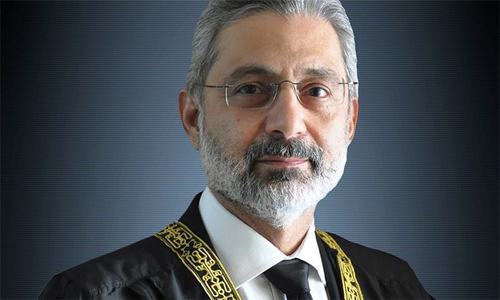ISLAMABAD: The counsel for Justice Qazi Faez Isa of the Supreme Court on Monday compared the tax returns of Prime Minister Imran Khan with that of the petitioner judge’s wife and asked why the former was still an independent taxpayer but his spouse was not when she was paying tax in the same range or higher.
Advocate Babar Sattar informed the SC full court that Zarina Montessarat Khoso Carrera, wife of Justice Isa, had paid Rs104,000 as tax in the tax year 2009, Rs143,055 in 2010 and Rs147,883 in 2011, whereas Prime Minister Khan paid Rs103,763 as tax in the tax year 2017.
“How can someone paying tax in the same range or higher be said dependent of her husband, but the prime minister paying almost similar tax is still independent?” asked the counsel, emphasising that the petitioner’s wife was an independent taxpayer like the prime minister.
The full court had taken up a set of challenges to the filing of a presidential reference against Justice Isa.
Referring to the rejoinder filed by the federal government to Justice Isa’s petition, Advocate Sattar argued that the federation itself had shown the records provided by the Federal Board of Revenue (FBR) to explain how the petitioner’s spouse was making money and regularly paying taxes, adding that it showed that she was not dependent of her husband.
Justice Bandial observes full court not to decide the nitty-gritty of tax laws, but allegation levelled against the judge in presidential reference
“Your argument is that the wife of the petitioner judge is financially as independent as the prime minister himself,” observed Justice Maqbool Baqar, a member of the bench. He, however, said that paying income tax did not mean that she had sufficient amount to acquire the offshore properties.
Advocate Sattar cited a 2017 article by FBR Chairman Shabbar Zaidi — “What constitutes disclosure of assets” — in which the author emphasised that inclusion of a sum in the wealth statement will not make it kosher if it has not been taxed and in the similar way the same will not become non-kosher if not chargeable and not included in the wealth statement.
Thus, the counsel said, the income earned by someone in a year was the main source for paying tax and anything mentioned in the wealth statement had nothing to do with income tax. He said the Income Tax Ordinance (ITO) pinned the liability of an individual and did not require him/her to do other than his/her income, adding that the ordinance never put vicarious liabilities on individual taxpayers.
The counsel contended that Section 116(2) of the ITO did not require disclosing assets of spouses or minors unless it had been created out of the money of the taxpayer. The independent income would not add to individual’s liability, he said.
“You mean to say that the taxpayer is obliged to disclose any asset if the money is related to him,” Justice Baqar observed.
Justice Bandial reminded the counsel that the full court was not sitting here to decide the vires of income tax returns or the nitty-gritty of tax laws, but the allegation levelled against the petitioner judge in the presidential reference was straight that the assets of certain family members had not been disclosed in the tax returns. But the counsel, he observed, was getting into specifics instead of focusing on the main points.
The counsel argued that if the interpretation of Section 116(2) of the ITO by the federal government was accepted then the wealth statement would never be reconciled.
Justice Bandial again interjected to remind the counsel that the fundamental point before the full court in the present hearing was the source of the funds, adding that the court was not going to interpret the rules. “Let’s move ahead, you have done a good job,” Justice Bandial said, adding that the counsel was getting too tedious.
“We are not chartered accountants sitting here and looking at the documents; the only case before us is the source of the funds,” Justice Bandial clarified.
But the counsel contended the source of funds was a fundamental point, adding that he was not representing the wife of Justice Isa who was holding the assets in her name. “The federal government is asking me to declare assets, but I say that if I declare the assets in my wealth statement, the statement will become inaccurate and will not be reconciled,” he emphasised.
Justice Bandial again observed that the counsel had been focusing on Section 116 of the ITO for the fourth consecutive day and becoming too tedious.
“We have understood that reconciliation of the wealth statement will not take place, if I do not own the assets,” observed Justice Yahya Afridi.
Justice Faisal Arab reminded the counsel that he had omitted to look into the allegation that since the assets had not been disclosed, the property had not been accounted for. Since the purchase of the assets had taken place abroad and the money had gone abroad, money laundering must have allegedly taken place, he observed, adding that this matter had not been addressed by the counsel.
“This conjecture has been made by the reference,” the counsel said.
But Justice Arab observed that the president wanted to launch an inquiry into this allegation.
“What I am trying to argue is that the obligation to disclose cannot be plucked out of the thin air,” Advocate Sattar said.
When the counsel contended that the legislatures after realising the issue of foreign assets created a requirement that every taxpayer having offshore assets should disclose the same before the tax authorities, Justice Syed Mansoor Ali Shah wondered whether under Section 230(E) of the ITO under which Automatic Exchange of Information regime was created, any information regarding offshore assets will ultimately land at the FBR.
“Therefore the self-disclosure about the foreign assets has become mandatory,” the counsel replied.
Published in Dawn, November 19th, 2019















































